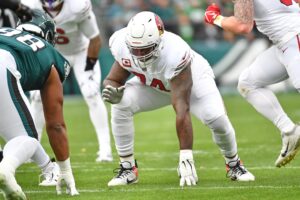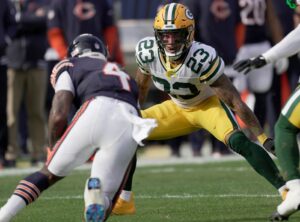There are do or die moments which will define a team’s season, franchise, and regime. The NFL season, for better or worse, is filled with hyperbole. Even the statistics can lead to hyperbole from an outside perspective focused on trends. However, each season is also quaintly divided into sections which allow the smartest men in the room to pivot and shift away from improper trends in the right moment. The Kansas City Chiefs in week 15 had all those notions catapult them to a 30-13 victory over the Los Angeles Chargers to take charge of the AFC West. After a brutal series of games which saw egregious statistical trends, the final stretch of the season has come and allowed for Andy Reid to address play calling by deferring to Matt Nagy while the defense has dramatically refocused. The Kansas City Chiefs week 15 stats hint at the underlying notion: intelligence and turnovers are the both powerful tools to reverse trends. No matter how bad the Chiefs looked just weeks ago, coaching, a fiery defense, and the December rush can revitalize a team and provide a juxtaposition of hope.
Kansas City Chiefs Week 15 Stats and Charts – Turning Over Trends
Chaos Theory
(At this point in the season, it might be a good time to revisit the concept of chaos theory. In week one, the mathematical debauchery was explained as essentially a fractal graph that assigned value to outcomes in a game, defining which team had more momentum or chaos control.)
The Chiefs had not been Arrowhead underdogs in Vegas since week four of the 2014 season, when they beat a three-point spread and upset the New England Patriots. However, recall Vegas betting lines is a business at the end of the day, and a one-point underdog line does not necessarily integrate pure mathematical trends. However, Vegas often does hint at trends, and this game was important for weighing the initial mathematical advantage of Arrowhead Stadium. Essentially, the age-old question of “Do fans care about hope, winning, or players to assert advantage?” was brought into light for the Arrowhead crowd.
And as pondered by the Oakland Athletics and Paul DePodesto in the MLB over a decade ago, winning and hope are the most powerful commodities. Chaos was given the benefit of the doubt, and came through for the Chargers first drive which featured a ferocious blitz and sack from cornerback Eric Murray. For the second straight week, the Chiefs started their defensive strategy with a blitz heavy philosophy, and initiated chaos by succeeding on those calls.
After exchanged punts, the Chiefs led a pivotal nine-minute drive, although merely managed a field goal. The end of the first quarter was a 3-0 Chiefs lead with clear control hinting at the Chiefs favor. Kareem Hunt was beginning to successfully kill time, and time is the last factor which Philip Rivers could lose.
Rivers time left on the bench thinking only gave way to more pandering drives back on the field. Chris Jones shut down the next Chargers attempted drive with a sack from the interior; the Chiefs defense was doing their part in handling chaos. Mathematically all the Chiefs offense had to do was score and control the clock.
Precise timing of passes is important to helping Alex Smith score explosive plays. After two Hunt runs, a quick pass to Travis Kelce, the Chargers were set on their heels. In other words, it was an opportune time to throw a 64-yard touchdown pass to Tyreek Hill.
Mathematically, the Chiefs were well over the 60-percentile mark to win halfway through the second quarter. Although, the timidity of clock control and four explosive plays gave way to the Chargers working their way for a succinct Melvin Gordon touchdown. Rivers has a knack for reversing the flow of a game.
Until the third quarter, no team would have a hint of scoring again when the Chargers ran a six-play drive for a touchdown. The drive had four successful plays, all of which were explosive – the bane of the Chiefs defense had let the Chargers take control of the game.
Alas, the Chiefs would take total control on the next four drives. First, Smith led the Chiefs on a seven-minute drive which ended in a quick pass to Hunt for the touchdown. Next, two plays into the Chargers drive, Marcus Peters intercepted an attempted deep pass. Third, the ever-reliable Harrison Butker extended the lead 20-13. Fourth, Austin Ekeler fumbled, Ron Parker recovered, and Butker nailed a powerful 51-yard field goal on the subsequent drive.
With ten minutes left in the game, the Chiefs defense held their own, Hunt scored another touchdown to ice the game, and the Chiefs ended the Chargers’ hopes of taking the lead in the AFC West standings. The game was never out of reach for the Chargers, but the Chiefs operated with a refined will and play-calling. Basically, the game was theirs to lose.
Clock, Runs, and Simplicity
The totality of the Chiefs offense could be summarized by clock control, their running dominance, and the simplicity of their execution. Although the Chiefs controlled the clock for 33:21 and the Chargers 26:39, those seven minutes of difference were contextually essential because the surrounding momentum it took from the Chargers. There is no better way to make 33 minutes of ball control feel like eons than 32 rushes for 174 yards.
The domination of the Chiefs run game, seemingly at will, was the momentous factor in the game. At any point needed, the Chiefs could call a run to kill the clock, gain momentum, and efficiently tire out the Chargers. The run directions also came at will; 11 runs were called in the middle of the offensive line and four to the outside.
Those 11 runs to the middle of the field resulted in 57 yards. Meanwhile, the exterior attacks saw two to the right and left, with nine yards and 13 yards of productivity respectively. The notion here to be understood is the dominance and will thrusted upon the Chargers. The run game controlled and dictated the very way the Chargers operated.
Functionally, this implied the pass game could work with similar efficiency. The 64-yard deep pass touchdown to Hill was a result of the Chiefs forcing the safeties to play upward, expecting a run from any direction. The Chargers secondary was forced to be constantly involved in the run-game, landing 15 of the rush tackles. Granted, they do operate with more physical safety assignments, but the main linebackers were constantly blown out of the play.
Further extrapolating on the importance of the run game, that singular 64-yard deep pass to Hill was the only deep attempt by Smith on the night. He could be exceptionally managerial without a need to usurp over the top. He threaded the needle where the Chargers allowed, and functionally created extended passes. Nagy is still trending to call longer, intrinsic routes to the exterior of the field instead of pure check-down attempts.
However, that would dismiss the athletic yards after the catch the Chiefs added this game. Orson Charles may have caught one pass, but he turned a quick target into a key 18-yard pass. Hill added onto his long pass by catching four of five targets short for 24 yards. Hunt further gashed the Chargers defense in the pass game by receiving seven of nine targets for 51 yards, including a short touchdown. Albert Wilson also deserves mention for his singular 15-yard catch.
Again, the Chiefs offensive efficiency and prowess on the evening pointed to a scheme from Nagy and Reid that took advantage of the Chargers weaknesses. As the run game goes, so goes the Chiefs offense. There was no reliance on one play set or one player to create efficient yardage. To be blunt, the game plan simply worked.
The Chiefs, when boring, are the best iteration of themselves. Save the powerful, explosive runs and the Hill pass, Hunt and Smith might as well have been drinking tea while delightfully scheming some fantastic baseball match from the 1800s.
The Chargers ferocity was waived null on the evening. Zach Fulton, Mitchell Schwartz, Eric Fisher, Bryan Witzmann and Laurent Duvernay-Tardif deserve a credited MVP for allowing one mere sack. Hence, the quaint and boring allusion to the drinking of tea – there was no fear on the evening.
Turnovers Turning Seasons
Since 2013, when the Chiefs force one or more turnover, they are 44-13. Raise that to two turnovers, the Chiefs have a 32-4 record since 2013. Turnovers, simply put, are the resolution to the ‘bend-not-break’ methodology. Hence, implying a fierce and competitive spirit to the nature and intrinsic format.
Ignoring the turnovers, the Chargers had a decent offensive showing – not great, but decent. Rivers completed 20 passes on 36 attempts for 227 yards and a touchdown while Gordon ran 19 times for 78 yards. Gordon also tacked on six receptions for 91 yards. Furthermore, in the previously mentioned sequence of plays, the Chargers were able to push the Chiefs around for 13 explosive plays.
Yet, build in context to the ‘decent’ output, and the Chiefs defense dominated while the Chargers withered away. Save explosive plays (which, are now natural to the Chiefs), the Chargers could barely tread water. Each time they attempted to establish some semblance of control, they faltered. They were forced to call desperate, deeper plays – a compete contrast to the comfort the Chiefs offense operated in.
In the first half, the Chargers had only two play calls that saw back-to-back success. During the second half, after the Chargers’ opening touchdown drive, the Chiefs forced a turnover on each drive (three interceptions, one fumble from Ekeler). Again, pointing to the notion, less the explosive plays, the Chargers were meandering.
Focusing on the pass game, the more nuanced technique in press coverage from Peters and Darrelle Revis worked to prevent definitive deep passes. Rivers attempted eight deep passes – he completed zero of them. Rivers succeeded by completing short routes to the exterior of the field with Hunter Henry and Gordon. Shore up the tackling more, and those plays will disappear as well.
In much the same way Rivers was forced to operate under pressure, the run game was predominantly defunct. Yes, Gordon may have had 78 yards and explosive runs, but the discomfort from the Chiefs forced an abandonment of outside extensions.
One of the ways Rivers has been extending the run game is using Ekeler in both wide runs and short, swing-passes. Derrick Johnson shut down Ekeler and ended the functional wide sweeps from Gordon. Kevin Pierre-Louis even came in to supply short support, with three tackles and a powerful showing in linebacker depth.
To summarize the Chiefs defensive performance, it might be said they were aware and prepared for the details that would soon be thrust their way. Bob Sutton was prepared by starting aggressively, then calling opportune coverage assistance when necessary. The longest Chargers drive was 6:40, ending in a punt. Although the Chargers had 27 minutes of control, those numbers were divided between 11 drives of utter incompetence.
Combining the start to the Chiefs over the last two weeks, the synthesis of success comes from aggression in the pass rush. Both wins have featured the Chiefs landing a sack on the first drive, press coverage, and a resilient effort from Jones in the interior. If the defense operates under those conditions for the remainder of the season, there is hope the defense may hold opponents to a facsimile of themselves.
Main Image:






